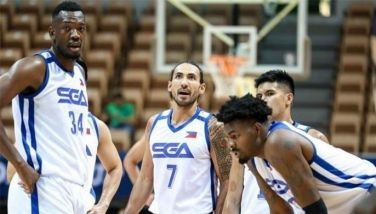Why basketball?
April 9, 2005 | 12:00am
It’s the eternal debate: why does a race that isn’t so tall love a sport that’s made for giants? This summer, although there are many, many sports being offered in clinics and camps (among them badminton and swimming), basketball is still multiplying at a dizzying pace, as proven by the occupancy rate of gyms throughout the country.
Ironically, not too many people recall — or even believe — that Filipinos didn’t take to hoops right away. In fact, men considered it an effeminate sport. The first major tournament in the country was probably the National Girls High School championship back in 1921. It was only a decade later when young men started taking to the streets and building their own basketball goals. Until the Berlin Olympics of 1936, there were only two gyms where basketball could be played.
"With just a makeshift goal, you can play basketball," adds Jimmy Cantor, president of the Philippine Sportswriters Association, which has seen basketball grow since 1949. "I’m sure you’ve seen street corners where kids put up basketball courts."
Before basketball swept us off our feet, sports seemed to be more of a dividing line than a unifying force. The wealthy played baseball, while those not too well off sought diversion in track and field, or playing street games. But, because of the Berlin Games, both the wealthy and middle class were thrust together on our first Olympic basketball team, and had no choice but to pull together.
"Basketball is very Filipino," claims sports photographer Tony Lu, who has been covering the game for over twenty years. "There is a team, yes, but it also relies heavily on diskarte, or the creativity of the player."
"Maybe it’s because there are many players whom Filipinos idolize," avers Jean Malanum, who writes for the Manila Bulletin. "So the kids, they try to imitate their idols. In turn, many people get interested in basketball."
"We had the likes of Sonny Jaworski, Atoy Co and other stars, and even the stars now who continue to give basketball the popularity that sustains its mass appeal," says Cantor.
"It’s not only a good sport, it creates investments and opportunities through playing the sport," says Clyde Mariano, who covers basketball and other sports for Tempo.
True enough, while other sports are starving for funding and sponsorship, basketball has it flowing out of its ears. The budget for the PBA’s Philippine team alone would support ten other sports for more than a year. But is our passion illogical?
"We can’t even win the title in Asian basketball," Cantor elaborates. "So, personally, I think we should concentrate on other sports, especially where we can win, particularly an Olympic gold medal. We should, perhaps, concentrate on swimming, triathlon.
"We should focus on sports where height is not a factor, particularly for us Filipinos," Malanum says. "Perhaps football, which isn‚t dependent on height. And then other sports like martial arts: we have wushu, karatedo and judo. Any other sport that doesn’t rely on height for an athlete."
When you think about it, they may have a point. Consider that Mark Spitz won nine gold medals for the USA (two in 1968, seven in 1972) in swimming.
How much would it cost to train a swimmer, even when you factor in all the travel needed to qualify for the Olympics? Or what about boxing? A full twelve-man boxing delegation would have the potential to win twelve medals, and boxers eat less, take up less space (hence, fewer hotel rooms and cars for travel) and are, therefore, more cost-efficient. The martial arts, as mentioned, would similarly give us more bang for the buck.
Unfortunately, because of the habit of some sports leaders to merely perpetuate themselves, it is hard to develop a relationship with a sport, particularly if you’re a sponsor. Another galling attitude is that of "gate-keeper"of their chosen sport. Some leaders make it difficult to organize tournaments or even join foreign competitions unless you have their blessing, which often entails paying unnecessary fees. Beyond that, as shown by the inability of some NSAs to supply the Philsoc with their requirements, they are simply disorganized.
"We in the PSA would like to help those national sports associations controlling these sports,"Cantor reveals. "But they have to have and show us a clear program first."
So it’s a chicken and egg situation. The sports need support, but they also need to prove themselves worthy. But they’re hamstrung in expanding precisely because they don’t have resources. And basketball, while it is very entertaining, may not be logical for us Filipinos, but, as a whole, has proven somewhat more organized. The mere fact that leagues continue to flourish proves that there is a formula that can easily be replicated on different scales.
Besides, anyone can tell you that passion is seldom logical.
Catch this week’s episode of The Basketball Show on ABC 5 at 3 p.m.
Ironically, not too many people recall — or even believe — that Filipinos didn’t take to hoops right away. In fact, men considered it an effeminate sport. The first major tournament in the country was probably the National Girls High School championship back in 1921. It was only a decade later when young men started taking to the streets and building their own basketball goals. Until the Berlin Olympics of 1936, there were only two gyms where basketball could be played.
"With just a makeshift goal, you can play basketball," adds Jimmy Cantor, president of the Philippine Sportswriters Association, which has seen basketball grow since 1949. "I’m sure you’ve seen street corners where kids put up basketball courts."
Before basketball swept us off our feet, sports seemed to be more of a dividing line than a unifying force. The wealthy played baseball, while those not too well off sought diversion in track and field, or playing street games. But, because of the Berlin Games, both the wealthy and middle class were thrust together on our first Olympic basketball team, and had no choice but to pull together.
"Basketball is very Filipino," claims sports photographer Tony Lu, who has been covering the game for over twenty years. "There is a team, yes, but it also relies heavily on diskarte, or the creativity of the player."
"Maybe it’s because there are many players whom Filipinos idolize," avers Jean Malanum, who writes for the Manila Bulletin. "So the kids, they try to imitate their idols. In turn, many people get interested in basketball."
"We had the likes of Sonny Jaworski, Atoy Co and other stars, and even the stars now who continue to give basketball the popularity that sustains its mass appeal," says Cantor.
"It’s not only a good sport, it creates investments and opportunities through playing the sport," says Clyde Mariano, who covers basketball and other sports for Tempo.
True enough, while other sports are starving for funding and sponsorship, basketball has it flowing out of its ears. The budget for the PBA’s Philippine team alone would support ten other sports for more than a year. But is our passion illogical?
"We can’t even win the title in Asian basketball," Cantor elaborates. "So, personally, I think we should concentrate on other sports, especially where we can win, particularly an Olympic gold medal. We should, perhaps, concentrate on swimming, triathlon.
"We should focus on sports where height is not a factor, particularly for us Filipinos," Malanum says. "Perhaps football, which isn‚t dependent on height. And then other sports like martial arts: we have wushu, karatedo and judo. Any other sport that doesn’t rely on height for an athlete."
When you think about it, they may have a point. Consider that Mark Spitz won nine gold medals for the USA (two in 1968, seven in 1972) in swimming.
How much would it cost to train a swimmer, even when you factor in all the travel needed to qualify for the Olympics? Or what about boxing? A full twelve-man boxing delegation would have the potential to win twelve medals, and boxers eat less, take up less space (hence, fewer hotel rooms and cars for travel) and are, therefore, more cost-efficient. The martial arts, as mentioned, would similarly give us more bang for the buck.
Unfortunately, because of the habit of some sports leaders to merely perpetuate themselves, it is hard to develop a relationship with a sport, particularly if you’re a sponsor. Another galling attitude is that of "gate-keeper"of their chosen sport. Some leaders make it difficult to organize tournaments or even join foreign competitions unless you have their blessing, which often entails paying unnecessary fees. Beyond that, as shown by the inability of some NSAs to supply the Philsoc with their requirements, they are simply disorganized.
"We in the PSA would like to help those national sports associations controlling these sports,"Cantor reveals. "But they have to have and show us a clear program first."
So it’s a chicken and egg situation. The sports need support, but they also need to prove themselves worthy. But they’re hamstrung in expanding precisely because they don’t have resources. And basketball, while it is very entertaining, may not be logical for us Filipinos, but, as a whole, has proven somewhat more organized. The mere fact that leagues continue to flourish proves that there is a formula that can easily be replicated on different scales.
Besides, anyone can tell you that passion is seldom logical.
BrandSpace Articles
<
>
- Latest
- Trending
Trending
Latest
Trending
Latest
Recommended































